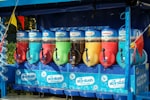The new CBA Memo of Understanding has a lot of dull reading in it, but every once in a while, you find something to laugh at, or a rule to pin on a particular incident. And even something to be impressed with.
Hands down, this is the best line in the entire document is this one, and who doesn’t want the backstory on how this became a rule:
59. Salary Arbitration
• Salary Arbitration briefs shall be limited to: 1) 42 pages (exclusive of indices, glossaries, tables of contents, and exhibits), and 2) size 12-point Times New Roman font, double-spaced, one-inch margins (except charts, tables, headings, footnotes, citations).
NHL players, it turns out, are no different from middle-schoolers who want everyone at their grade eight graduation:
81. Travel for Up to 4 Additional Immediate Family Members to NHL Awards and Other NHL Special Events
Insert new CBA §16.16 as follows: 16.16 NHL Awards The Club must provide Business Class air travel to and from the NHL Awards host city to any Player nominated for an award or who is otherwise requested by the League to participate in an NHL Awards related event. Players shall also have the option to invite their Spouse (or Living Companion) to the NHL Awards, as well as up to four (4) immediate family members (e.g., the Player’s parents, grandparents, siblings, and/or children), with airfare to be paid at the Club’s expense (Business Class travel for Spouse (or Living Companion) and Economy Class travel for immediate family members).
One of the interesting things about this new CBA is the amount of language around some very specific players’ right issues. In the old CBA this innocuous statement:
15.11 No Conditioning Camp. Other than the Conditioning Camp described in Section 15.10 above, a Club is prohibited from organizing or holding any mandatory or voluntary camp in the off-season for any Players.
Has been expanded to cover an entire range of rules teams must follow, and an enforcement process if they break them that boil down to this: Players want their offseason to be an offseason.
Inside the list of things clubs are not allowed to do, which adds up to “don’t call me, I’ll call you” is this insight into the modern world:
Clubs are not permitted to use electronic or computerized programs to track or monitor a Player’s offseason activity or conditioning.
Somewhat related to that is what I’m calling the Jake Dotchin rule:
84. Fitness Testing
The parties agree to create a working group to evaluate Fitness Testing practices and to agree upon fitness testing protocols with best efforts for League-wide implementation by no later than the beginning of training camp for the 2020/21 season. The parties agree to implement appropriate penalties for violations of the fitness testing protocols including fines and other penalties as determined to be appropriate by the Commissioner or his designee, in consultation with the Executive Director of the NHLPA.
And the Jared Cowen rule has some discussion on the time limits for getting a second opinion when a team physician declares a player unfit to play. But in general this new CBA outlines the team’s responsibilities in facilitating second opinions, and institutes a complaint process and requires this poster and an attendant fact sheet be displayed:
The NHLPA used this period of negotiation to get more for their players than just some escrow numbers they could live with. They made gains in retirement benefits as well.
Under the heading of putting their money where their mouth is, the NHL is taking some of the Industry Growth Fund (a centrally managed fund that is used to pay lower-grossing teams some supplementary money each season) and putting it to a new purpose:
The parties agree to dedicate up to $2.5 Million per year of currently available IGF dollars to help fund programs and initiatives aimed at increasing diversity and inclusion in the game, as well as promoting social justice and racial equality, with any and all such grants subject to the usual IGF Committee review and approval process. The amount so dedicated pursuant to this paragraph will be increased to a minimum of $5 Million per year upon the increase in funding levels from $20/$60 [million] to $30/$90 [million] as contemplated in the paragraph above.
You or I might think issuing a press release to humbly brag about that would be good PR, but the NHL is either too busy, or just bad at PR.
This stood out as an odd thing to think you might need to define:
Rounding • Fractional games/days/statistics are rounded up if .50 or greater (before rounding) and are rounded down if less than .50 (before rounding).
Rounding is rounding, right? Well, no. Call this the modified Yzerman rule. They haven’t fixed the main CBA, where he leveraged the ambiguity to avoid paying Jonathan Drouin a bonus, but they made sure we knew how to calculate the new ELC slide rule for sure.
And finally, the new CBA sees the old trade conditions modified to remove terms around re-signing players:
65. Trade Conditions Making it More Onerous for an Acquiring Club to Re-Sign a Player
Clubs shall not be permitted to include as a condition in the Trade of a Player (“Traded Player”) from one Club (“Trading Club”) to another Club (“Acquiring Club”), a modification to the compensation exchanged between the Trading Club and the Acquiring Club, either in the event: (i) that a Club signs the Traded Player to an NHL SPC, or (ii) of the subsequent Assignment of the Traded Player by the Acquiring Club. The restriction in (i) shall only be applicable when the Traded Player has a current or future NHL SPC at the time of the Trade.
Unfortunately they did not make this applicable to currently open pick trade conditions, so if the Leafs do re-sign Kyle Clifford, that third rounder does upgrade to a second.



